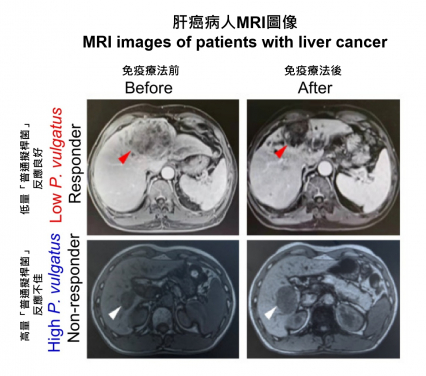A research team led by the Department of Clinical Oncology, Centre of Cancer Medicine, School of Clinical Medicine, LKS Faculty of Medicine, the University of Hong Kong (HKUMed), has identified a critical factor contributing to the failure of liver cancer immunotherapy. The study discovered that the gut bacterium Phocaeicola vulgatus can disrupt the immune system, leading to resistance to immunotherapy in some liver cancer patients. This research reveals the significant impact of gut microbiota on cancer treatment, and proposes 'microbiome modulation therapy', which involves modifying gut microecology or supplementing with key metabolites to enhance the effectiveness of liver cancer immunotherapy. The findings, published in the international journal Cell Reports Medicine [link to the publication], offer a novel direction for improving immunotherapy efficacy.
Gut-liver microecological connection
While immunotherapy has emerged as a breakthrough in cancer treatment in recent years, its effectiveness in liver cancer has been inconsistent, with some patients showing a poor response for reasons that remain unclear. By analysing the gut microbiota of liver cancer patients, the research team identified Phocaeicola vulgatus as a potential culprit behind immunotherapy failure.
The study found that the trillions of microorganisms in the gut microbiota play a pivotal in shaping the liver microenvironment. 'For years, scientists have observed a striking difference in gut microbiota composition between cancer patients and healthy individuals. This difference affects far more than digestive function; the gut microbiota acts as an "invisible control centre" inside the body, influencing liver tumours through the complex gut-liver axis,' explained Professor Spring Kong Feng-ming, Clinical Professor and Alice Ho Miu Ling Nethersole Charity Foundation Professor in Holistic Cancer Care, the Department of Clinical Oncology, Centre of Cancer Medicine, School of Clinical Medicine, HKUMed.
The liver and gut share a uniquely interconnected relationship, known as the 'gut–liver axis', which enables constant two-way communication between the organs. Gut microbes produce various metabolites that travel to the liver via the bloodstream or portal vein, directly influencing the liver's immune responses and metabolic functions, and potentially promoting or inhibiting tumour growth. The research team found significantly elevated levels of Phocaeicola vulgatus in liver cancer patients who responded poorly or were resistant to immunotherapy.
In further experiments, researchers transplanted the gut bacterium Phocaeicola vulgatus into mouse models with liver cancer. The results showed that mice initially sensitive to immunotherapy developed drug resistance after transplantation, confirming that this bacterium indeed interferes with the immune system and reduces the efficacy of immunotherapy.
Mechanism of disruption: Phocaeicola vulgatus depletes key metabolite and reduces treatment efficacy
Indole Acetic Acid (IAA), an important bacterial metabolite, plays a vital role in the activation and proliferation of cytotoxic T cells —the immune system's frontline defenders against cancer. Sufficient IAA levels enable these T cells to function effectively, increasing the success rate of immunotherapy. However, the research team discovered that Phocaeicola vulgatus consumes large amounts of the precursor substances needed for IAA synthesis, resulting in decreased IAA levels in the gut. The depletion hampers the ability of T cells to effectively recognise and attack tumour cells, ultimately impairing immune function and diminishing treatment efficacy.
Advocating microbiome modulation therapy for precise, personalised treatment
This study reveals a critical connection between gut bacteria and liver cancer immunotherapy failure, identifying Phocaeicola vulgatus as a potential biomarker for future development of 'gut microbiome modulation therapy'. 'By measuring the levels of Phocaeicola vulgatus in the gut of liver cancer patients, clinicians could anticipate a patient's response to immunotherapy,' explained Dr Zhao Caining, the first author of the research. 'This discovery could enable doctors to formulate more effective treatment strategies tailored to a patient's gut microbiota profile. Approaches such as IAA supplementation or gut microbiota modulation may enhance immunotherapeutic efficacy, marking a significant step towards precise, personalised treatment in the future.'
Professor Spring Kong emphasised, 'This research highlights the crucial role of gut microecology in cancer treatment. Unlike traditional anti-cancer strategies, our findings demonstrate that cancer treatment should extend beyond targeting tumours alone; it is essential to integrate microbiome regulation into treatment strategies. With deeper insights into gut microbiota, we hope to develop more effective combination regimens, ultimately driving higher success rates in liver cancer immunotherapy.'
About the research team
The research was led by Professor Spring Kong Feng-ming, Clinical Professor and Alice Ho Miu Ling Nethersole Charity Foundation Professor in Holistic Cancer Care, the Department of Clinical Oncology, Centre of Cancer Medicine, School of Clinical Medicine, HKUMed. The first authors are Dr Zhao Caining, Postdoctoral Fellow, and Dr Li Shanshan, Associate Researcher, both from the same department.







